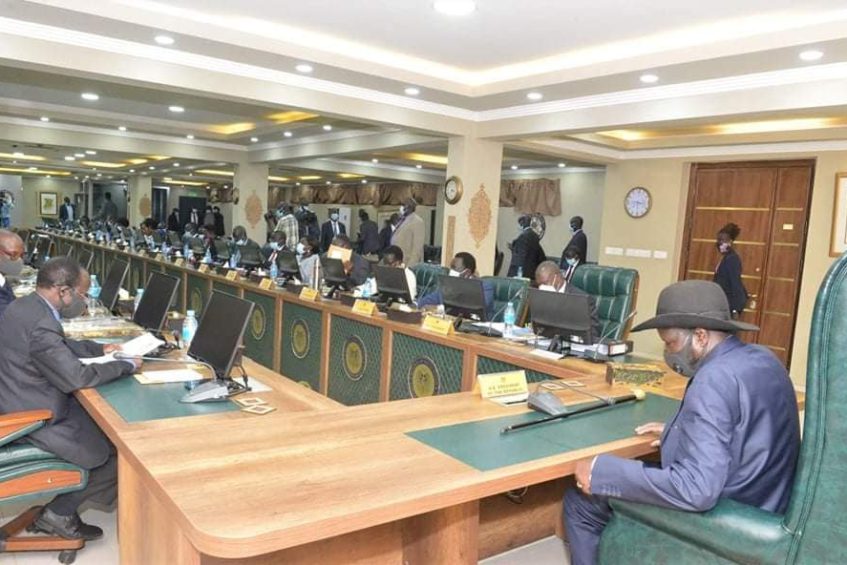
A recent cabinet meeting in progress | Credit | Courtesy
The speaker of the unity parliament has called on the executive to consider increasing salaries of civil servants to meet the current market demands.
Jemma Nunu Kumba says both civil servants and organized forces should receive better pay to cover for their needs and that of their families.
In June last year, the government’s economic cluster passed a resolution to adjust the salaries of all civil servants across the country.
A new resource envelope for the fiscal year 2021/2022 budget was presented by the Minister of Finance.
It learned that the money allocated for current wages and salaries amounts to SSP 70, 326, 219, and 798 after devaluation of the pound.
The cluster looked at the current pay scale and the available financial resources to make the adjustments.
In August 2021, President Kiir reemphasized immediate plans of his administration to increase the salaries of civil servants by 100 percent.
Kiir noted that since the government floated the South Sudanese pounds in 2015, civil servant salaries have not been adjusted.
Government employees, especially soldiers, police, and teachers, are reportedly living in squalid conditions across the country.
A nurse and midwife in South Sudan earn between 2,000 and 5,000 South Sudanese pounds per month, while a doctor receives 6,840 Pounds a month – an equivalent of $38.
A foot soldier receives roughly 1,500 pounds or $6 per month.
This cannot pay for their food, housing, transport, and others.
Last week, members of the new parliament – the largest in Africa – passed their emoluments and privileges bill, increasing their salaries.
Jemma Nunu Kumba, the speaker of the parliament now says there is urgent need to review the salary structures of the civil servants before they are approved by the august house.
“The parliament is concerned about the public and the salary structures that they are receiving now. The inflation does not match with the current structures of the civil servants,” Nunu said.
“It is in our interest as a parliament that this emolument, for the organized forces in general, is reviewed so that a soldier can be able to get something that can really help meet his needs.
“The parliament has now amended or reviewed its own emolument act, it is also expected that the executive should also look into the issue of the civil servants. We expect the executive to consider this and then bring it to us in parliament.
“If it is going to be part of the budget, then we will also discuss it and pass it together with the budget.
“The minister of finance should ensure that there are enough resources that will cover it, because today you can pass a law increasing the salaries but tomorrow you will not have enough resources to cover it.”
Experts say South Sudan receives millions of dollars in oil and non-oil revenues monthly.
The government has, however, been struggling to pay its workers.
Civil servants and other employees on government payroll often go for nearly 5 months without salaries.
Support Eye Radio, the first independent radio broadcaster of news, information & entertainment in South Sudan.
Make a monthly or a one off contribution.
Copyright 2024. All rights reserved. Eye Radio is a product of Eye Media Limited.